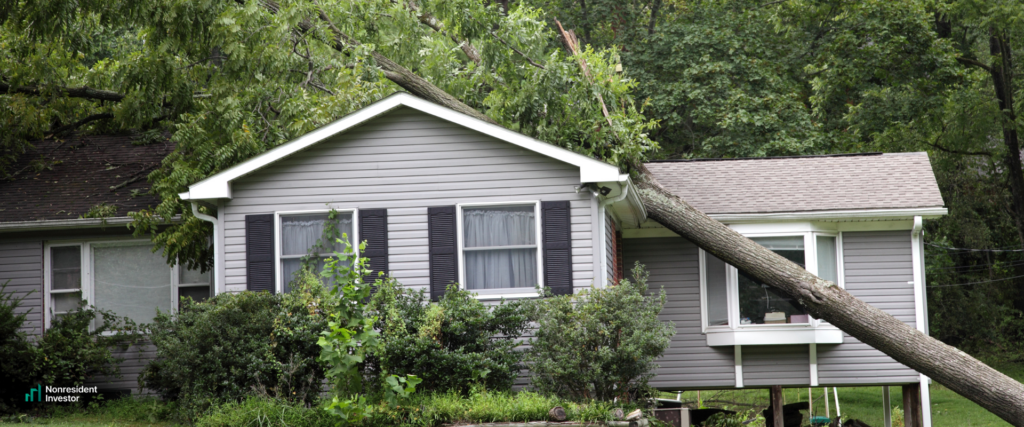If you’re a nonresident investor buying property in the US, your end goal is to create positive cash flow and maximize ROI. But what if something unfortunate (e.g., a house fire) happened to your property? You’d lose a huge part of your investment! That is why you need to start thinking about professional property management and property insurance.
And before you claim that the odds of something like that happening are low, let’s talk facts:
- Around 358,00 home-based fires break out each year in the US;
- In 2021, nearly 1.5 million US homes were ravaged by natural disasters;
- 1 out of 20 homeowners claims their insurance each year for one reason or another.
A wise investor always looks for a way to minimize risk. That’s why many investors buy larger buildings constructed from sturdier materials that are more resistant to various natural disasters like hurricanes.
However, these properties are much more expensive and aren’t accessible to all investors. Still, there’s an easy way to minimize risks even when investing in smaller properties like houses — by buying property insurance.
In this article, we will explain what property insurance is, what types of damages it covers, and illustrate why ensuring your property as a foreign investor is important in more detail.
Let’s start from the beginning…
What Is Property Insurance for a Nonresident Investor?
Property insurance represents a series of policies that provide homeowners with liability coverage for many situations that may result in property damage. In other words, property insurance allows nonresident investors to recoup some of the money in case something unexpected happens to their investment.
Property insurance may consist of several policies, including homeowners, renters, or flood and earthquake insurance. Each of these policies covers different scenarios and can be a valuable addition, depending on where your property is located and what you’re doing with it.
Currently, 85% of US properties have at least one insurance policy, which shows how valuable this protection may be.

What Nonresident Investor Property Insurance Covers
Most property insurance policies cover a number of damages, including but not limited to:
- Damages caused by various weather effects (e.g., fire, hail, snow, ice, lightning);
- Damages caused by vandalism or theft;
- Liability coverage when someone other than the owner or renter is injured on the property.
Although most basic property insurance policies don’t cover damages caused by events like natural disasters, there are special policies you can purchase that do cover that. However, those come at an extra cost.
What Nonresident Investor Property Insurance Doesn’t Cover
Even though property insurance covers most damages from natural disasters and man-made damages, it is not all-encompassing. Here are a few cases where property insurance won’t have your back:
- Acts of terrorism;
- Acts of war;
- Willful destruction;
- Property degradation due to age;
- Damages to the property caused by a lack of maintenance and occupancy;
- Damages caused by termites.
However, the above scenarios are incredibly rare or easily preventable by regular home maintenance and check-ups.

How Property Insurance Pays Off Damages
Despite being an excellent risk-mitigation tool, property insurance doesn’t cover all types of damages equally. Here are three types of insurance coverages you can claim for different types of damages:
- Replacement Costs — These include complete coverage for repair fees at the same or equal value.
- Actual Cash Value Coverage — This includes replacement costs for lost items, but with depreciation. That means the value of the coverage will drop based on each item’s age.
- Extended Replacement Costs — This coverage will go beyond the limit if labor costs have gone up. However, this will never exceed 25% of the coverage limit.
How Much Does Property Insurance Cost Nonresident Investors?
The price of property insurance will depend on several factors, including but not limited to:
- The state you’re investing in;
- The property insurance agency you partner with;
- The size of your property;
- The type and number of insurance policies you buy.
But if you’d like a more precise estimate, the nationwide average cost of homeowner’s insurance is around $1,700 per year for properties valued at around $350,000 on average. If your house is, for instance, valued at about $100,000, your yearly property insurance fees would be around $1000.
Do keep in mind that the above are averages and only include the homeowner’s insurance policy. If you buy additional insurance policies, your costs will increase.

Can a Foreigner Buy Property Insurance?
Yes, nonresident investors can buy property insurance the same as US citizens. However, the process will be even easier if you own a US LLC. The reason is that having a US-based company only makes you seem more reliable in the eyes of insurance providers. If you’re a nonresident investor, you should already have a registered LLC in the US, so you should have no issues getting an insurance policy.
Note: When looking for an insurance company, we advise you to always ask around locally before settling for one. Word of mouth is the most reliable way to find the best insurance partner due to the prevalence of property insurance holders in the US.
5 Reasons Foreigners Investing in US Real Estate Shouldn’t Think Twice About Getting Property Insurance
As a foreign investor living far from your US properties, getting property insurance is the easiest way to mitigate unnecessary risk. However, that isn’t the only reason nonresidents buy property insurance. Here are the five most compelling ones:
1. Protecting Your Investment From Natural Disasters
Although we can control many factors, weather is not one of them. And parts of America are widely known for being susceptible to various natural disasters like hurricanes, flooding, wildfires, and more. A single calamity can wipe out your entire investment if you’re unlucky.
That’s why it’s always paramount to do your homework before buying a property — look up whether the state you’re buying in is susceptible to natural disasters. For instance, Florida, Texas, and Louisiana are the states with the most hurricanes each year. Knowing that allows you to buy additional insurance policies to protect your investment if it suffers damage.
You should also consult your insurance agency on these policies since they’ll often suggest you the most suitable ones for the state you’re investing in. Most insurance agencies have extensive data on natural disasters across the US, so they’ll likely be your best ally in assessing risk.
Note: You can further reduce risk by investing in larger buildings made from sturdier materials like concrete, which are naturally much more resistant to natural disasters. However, that comes at a much steeper price.

2. Property Insurance Is a Small Expense for the Value It Brings
Since you’re generating passive income from your properties, that income will be more than enough to cover property insurance costs. In fact, this extra expense will have minimal impact on your ROI but will allow you to sleep soundly at night.
But the best part about property insurance costs is that you can file them as business expenses when handling your taxes (if you’re operating through a US LLC). This method allows you to reduce taxes legally when following a strategy that includes running your investment business in the red.
At NRI, we teach this investment strategy to all our clients, as it is a tried-and-tested method of creating positive cash flow and achieving high ROI. Our CEO, Luka Malkovich, used this tactic to expand his investment portfolio and achieve financial freedom. Now, he’s looking to share his knowledge and experience with other aspiring investors. If you’d like to learn how he achieved this, why not hop on a short discovery call with him?
3. You’ll Have an Easier Time Finding Tenants If Your Property Is Insured
Here’s the thing — property insurance isn’t only good for you, the investor, but your tenants as well. After all, if something happens to their home, and they have no coverage for it, they will be the ones left on the street, not you. That’s why tenants often ask landlords if their property is insured before signing a contract.
Without property insurance, many tenants won’t even consider moving in, and that’s bad for business. And that’s especially true for more reliable, long-term tenants who value security. So don’t miss out on making your property more attractive to home seekers — it will pay out in the long run.
4. Having Insurance Covers the Only Justifiable Risk of Real Estate Investing
There are many benefits to investing in US real estate, but one of the most appealing ones to investors is that it comes with little risk. Unlike capital gain investing, cash flow strategies like real estate aren’t volatile. And the small amount of risk they do carry mainly comes down to unexpected property damage.
Getting one or several property insurance policies allows you to take even that tiny amount of risk out of the picture. A dream scenario for any investor, wouldn’t you agree?

5. Property Insurance in the US Is Reliable
Some investors may be reluctant to purchase a home insurance policy because they got burnt at one point or another. But here’s the thing — the insurance culture in the US runs deep because people trust insurance companies. And you should too.
When you get property insurance in the US, everything is transparent. Your property’s estimated value is always listed on your contract alongside everything else you need to know. Even in the worst-case scenario, when you need to claim your insurance, you can do so within days.
The reason is that US insurance companies are some of the best in the world, and many have been in the business for decades. So as long as you pick a reliable insurance company, you can rest assured your property will always be safe.